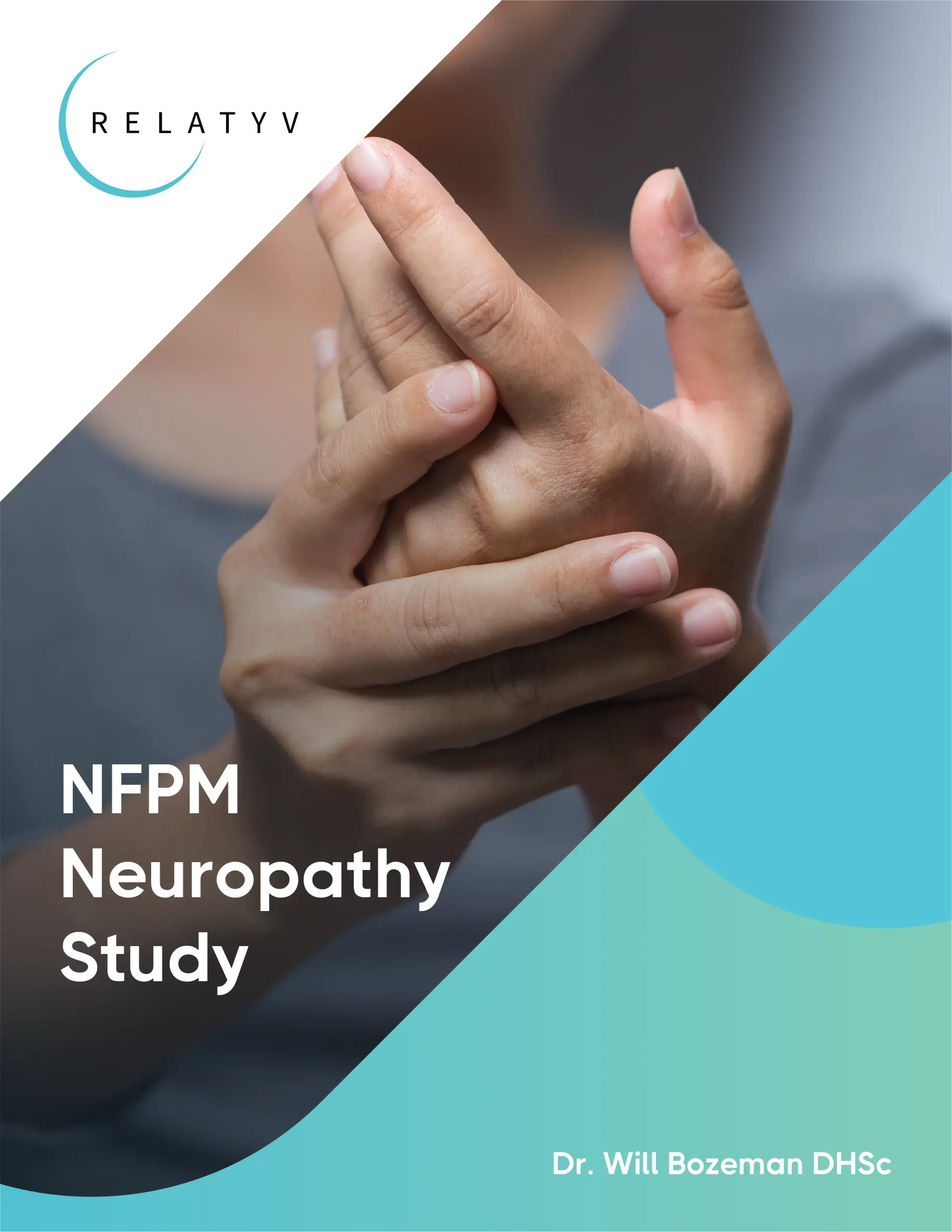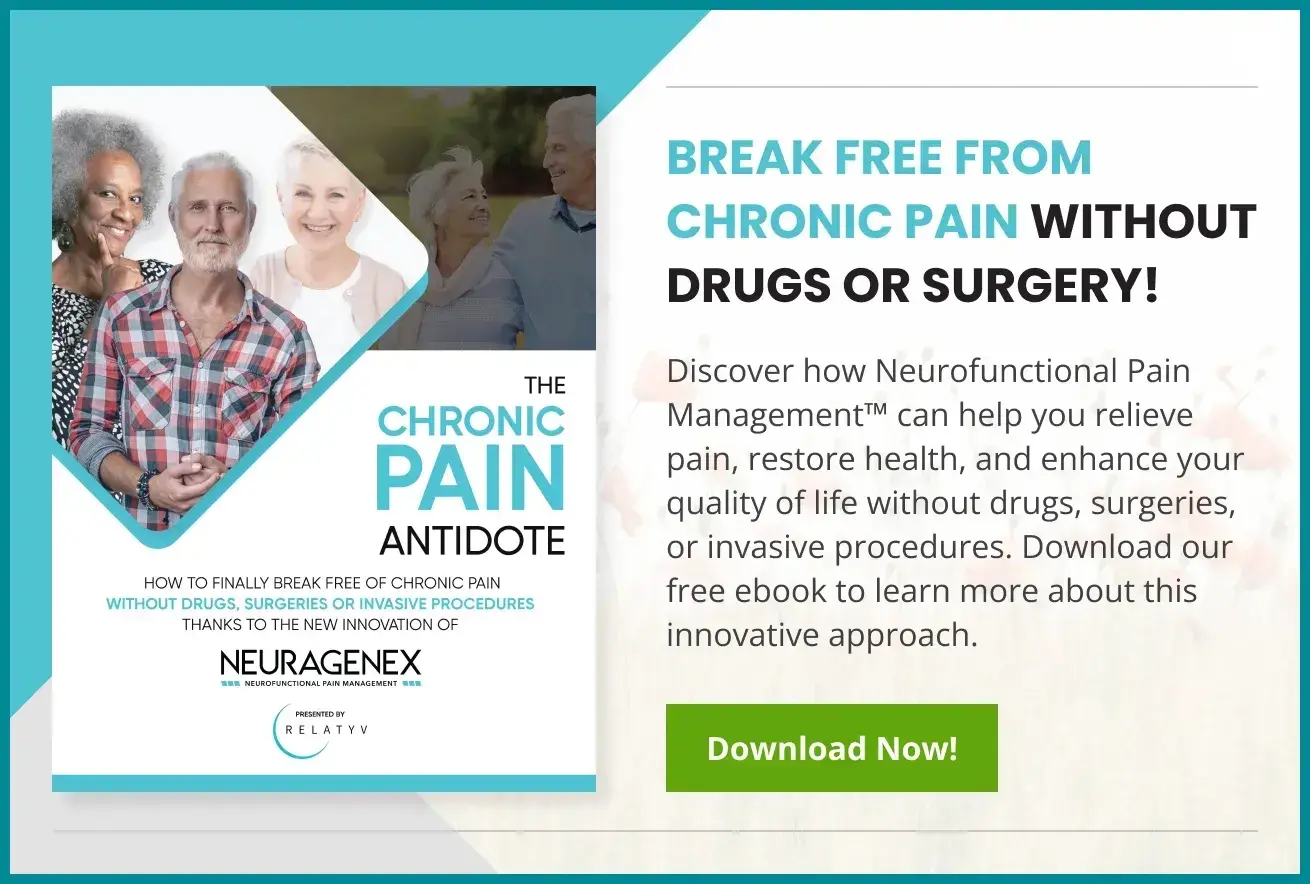We accept all major insurances
Enter your details to begin your journey with us
Non-Surgical & Drug Free Solution
Are You Ready to be Free From Pain?
Contact Us Today!
Enter your details to begin your journey with us


We are happy to have assisted them.
Countless people have come to us, sought help, and changed their lives for the better. Read about how they finally rid themselves of the pain, allergies and discomfort. Imagine yourself being one of them—soon.

Ed was diagnosed with diabetic peripheral neuropathy (DPN) and type two diabetes, Ed experienced significant pain, numbness, and tingling in his feet and ankles. Upon starting treatment with Neuragenex, he found the results to be remarkably effective...

Robert struggled with plantar fasciitis and neuropathy. He experienced significant pain and stiffness in his legs, particularly in his right foot, which made walking difficult and sometimes confined him to staying at home. Dissatisfied with the medic...

Wanda shared her testimonial about experiencing post-surgery knee pain. She described the pain as akin to little pins sticking into her knee, causing a throbbing sensation. After undergoing 14 Neuragenex NFPM treatments, Wanda noticed significant imp...

Taylor Royce has experimented with various treatments for pain relief before discovering Neuragenex. His previous attempts included relying on sleep and occasional painkillers like Ibuprofen. However, since starting electroanalgesia, Taylor has notic...

Sunshine hadn't tried any treatments until stumbling upon Neuragenex. Previously relying on medications for relief, she was curious to explore alternative options and see if they could provide any improvement.

After trying different medications, Shelly visited Neuragenex and considered its life-saving treatments. Halfway through her treatments, she had already experienced improvements, as she did not feel any discomfort at night anymore.

Sheldon Stromness, a patient at Neuragenex, experienced remarkable improvement in his mobility and pain management. After his treatments, he can now engage in activities like kneeling and handling concrete without discomfort. His pain has been comple...

Saibo, a patient under the care of Neuragenex, expresses contentment with his experience thus far. Finding the staff to be kind and welcoming, Saibo appreciates the friendly atmosphere.
IV nutritional therapy, or intravenous therapy, involves administering vital nutrients directly to the bloodstream through an IV. This type of treatment bypasses the digestive system, allowing for maximum absorption and utilization of nutrients by the body. This treatment typically involves a personalized blend of vitamins, minerals, and amino acids tailored to meet each patient’s specific needs.
In the context of Neurofunctional Pain Management, IV nutrition therapy can be incredibly beneficial for patients suffering from chronic pain by addressing various underlying causes.
The following are a few examples of the essential vitamins commonly included in IV nutrition therapy and how they can be beneficial in providing pain relief depending on the symptoms:
Amino acids are known as the building blocks of proteins in the body. They also play a vital role in numerous biological processes, including muscle development, immune function, and tissue repair. In IV nutrition therapy, amino acids are often used to support muscle and tissue regeneration and promote overall healing.
Ascorbic acid (commonly referred to as vitamin C) is an important antioxidant. One of it’s main purposes is to protect the body’s cells against potential damage. Ascorbic acid also plays a critical role in the body’s production of collagen, which is a protein that helps to support healthy connective tissues such as skin, tendons, and ligaments. Finally, ascorbic acid can help to reduce inflammation and boost immune function, making it a common component of IV nutrition therapy for pain management patients.
Glutathione is an antioxidant that helps protect your cells from oxidative stress. It plays a crucial role in detoxification, helping to remove harmful toxins from the body. For chronic pain patients, glutathione can help reduce inflammation and relieve pain by supporting the body’s natural healing processes.
B vitamins, including B1 (thiamine), B2 (riboflavin), B3 (niacin), B5 (pantothenic acid), B6 (pyridoxine), B7 (biotin), B9 (folic acid), and B12 (cobalamin), are vital for various bodily functions, including energy metabolism, cell growth and development, and nerve function. For chronic pain patients, B vitamins can help to improve energy levels, reduce inflammation, and support nerve health.
IV nutritional therapy is a safe procedure with minimal risk of side effects. Depending on the solution used, IV therapy can provide various benefits for chronic pain patients. Because we don’t use any medical drugs in our IV solutions, the worst side effect is typically temporary discomfort at the site of the IV insertion, which can include light bruising or swelling that will generally go away after a day or two. Some of the potential benefits of IV nutrition therapy include:
IV nutrition therapy can help boost the immune system by providing essential nutrients the body needs to function optimally, such as vitamin C. These nutrients can help patients fight infections and illnesses more effectively, ultimately leading to better health outcomes. Boosting the immune system can also relieve chronic pain by reducing inflammation and preventing secondary infections.
IV nutrition therapy can also be used to treat nutrient deficiencies, which can be a common issue for chronic pain patients. Certain deficiencies can contribute to chronic pain symptoms, such as vitamin D deficiency causing muscle weakness and bone pain. IV nutrition therapy can provide a concentrated dose of the necessary nutrients to help alleviate deficiencies and improve overall health.
At Neuragenex, we will evaluate each patient’s bloodwork to determine any nutrient deficiencies that can be addressed using IV therapy.
IV nutrition therapy can also promote cardiovascular health. For example, nutrients like magnesium and potassium can help regulate blood pressure and decrease the risk of cardiovascular disease. Magnesium can also help to relax the muscles and reduce muscle pain, making it particularly beneficial for patients suffering from chronic pain. By supporting cardiovascular health, IV nutrition therapy can lead to improved health outcomes and reduce the risk of future health complications.
IV nutrition therapy can also help to ease anxiety and promote relaxation. For example, certain nutrients, such as magnesium and L-theanine, have been shown to help reduce anxiety and improve overall mood. By providing these nutrients directly to the bloodstream through IV therapy, patients may experience greater relaxation and reduced anxiety symptoms.
The thing about IV nutritional therapy is that it can help provide relief from a wide range of symptoms because of the fact that different nutrients are required for various functions. The following patients may benefit from IV nutrition therapy:
Dealing with any type of pain in the elbow can make daily activities difficult, since the elbow is used for almost all movements involving the arm, from bending and straightening to rotating and...
Migraine And Chronic Headaches
Chronic migraines are a serious condition that profoundly impacts all aspects of your life – for days at a time. During a migraine attack, the pain may be so severe that it can force you to stay in a quiet, dark room for hours, influencing your ability to...
Metabolic dysfunction is a complex disorder that affects one in three adults in the US and dramatically increases a person’s risk to suffer from heart disease, stroke, and diabetes. Often caused by risk factors such as inactivity, obesity, and high blood...
Knee pain is an extremely common complaint affecting people of all ages and backgrounds. It is often the result of repetitive use or injuries, but it can also be caused by various conditions. Knowing the possible causes of knee pain, associated symptoms, and...
Any stomach or intestinal discomfort can be a major disruption, causing significant physical and emotional distress. Even if it's temporary, it can throw a wrench in your day-to-day routine....
Fibromyalgia can be an incredibly debilitating condition that causes severe pain and fatigue that can prevent you from engaging in everyday activities. In fact, people with fibromyalgia tend to be more sensitive to pain in...
Endometriosis is a lifelong, painful condition that affects 6.5 million women in the US alone, causes a loss of over six hours of productivity a week, and profoundly impacts a person’s professional and emotional life. Nonetheless, surveys have shown that...
Interstitial cystitis (IC) is a chronic health condition affecting the bladder, causing persistent pain and discomfort in the lower abdomen. Aside from pain, several other uncomfortable symptoms may develop throughout the urinary system, significantly...
Substance use disorder (SUD) is a condition defined by the repeated use of substances, despite their harmful...
It's estimated that over 20 million Americans suffer from peripheral neuropathy. In fact, many believe it's significantly higher than that because the condition often goes undiagnosed and...
Did you know that the peroneal nerve, also known as the fibular nerve, conveys crucial messages between your brain and your lower legs, feet, and toes? In fact, this is such an important nerve that if it becomes dysfunctional, all of the orchestrated...
Osteoarthritis is a degenerative joint disease. It occurs when the protective cartilage between the bones in the joints wears away, leading to bone-on-bone contact and pain. Osteoarthritis can affect any of the body's joints, but most commonly affects hands,...
A tension headache is a type of headache caused by muscle contractions in the head and neck. Muscles are usually tight due to stress, anxiety, poor posture, or other factors. This tension can cause pain in the forehead, back of the head, and...
Carpal tunnel syndrome is a nerve condition that develops when the median nerve in the wrist is compressed, irritated, or damaged. The median nerve is a nerve located outside of the brain and spinal cord. It is responsible for controlling wrist movements and...
Phantom pain is a type of chronic pain that occurs when an amputated part of the body is still sending signals to the brain that it is there. As you can imagine, feeling such pain can be incredibly...
Also known as tic douloureux (painful tic), Trigeminal neuralgia (TN) is a chronic, lifelong condition that causes agonizing pain. The painful episodes usually focalize on one side of the face, develop in a matter of seconds, and can disrupt your daily...
Knee pain, in general, is one of the most common types of pain people experience in the U.S. In fact, knee pain is the second most common cause of chronic pain. When you consider the fact that the knees are among the most regularly used joints in our body,...
Chronic headaches plague over half of the global population, but no two types of headaches have the same impact on a person’s life. Among these are cluster headaches, some of the most painful head conditions known today. Also known as trigeminal autonomic...
Osteoporosis, a common musculoskeletal disorder, weakens bones and increases fracture risk. It develops silently, often diagnosed after a fracture. Understanding bone metabolism and types of osteoporosis is crucial for prevention and...
Temporomandibular Joint (TMJ) Dysfunction
Living with TMJ can be incredibly challenging. After all, this disorder affects the temporomandibular joint, which plays a massive role in being able to move your jaw. As such, symptoms can be exacerbated when you eat, talk, or yawn. If you have the symptoms...
Tendonitis occurs when a tendon becomes inflamed. It’s also a relatively common condition caused by overuse, injury, repetitive movement, or prolonged periods of inactivity. As such, it’s no surprise that over 70,000 adults in the U.S. miss work every...
Irritable bowel syndrome (IBS) can be a challenging and frustrating condition to live with. Although it does not usually lead to serious health problems, IBS can significantly impact daily activities and overall...
Dealing with chronic pain and stiffness in the shoulder can be a very challenging experience, especially when it impedes your day-to-day...
Tarsal Tunnel Syndrome causes foot and ankle pain due to involvement of the posterior tibial...
Explore the causes, symptoms, and effective treatments for chronic fatigue syndrome (CFS). Discover insights on managing and living better with...
Dealing with any type of pain in the elbow can make daily activities difficult, since the elbow is used for almost all movements involving the arm, from bending and straightening to rotating and...
Sciatica is a painful nerve condition that can cause extreme discomfort and even disability. It results from a pinched or irritated sciatic nerve, which is a long nerve that runs all the way from the lower back to the buttocks and...
Ankle sprains are a relatively common injury. They occur when the ankle ligament is overstretched or torn. This can happen from a sudden twist, fall, or impact to the ankle joint. Ankle sprains can vary in severity, with some causing mild discomfort while...
Experiencing a bone fracture is undeniably a defining and challenging time. It causes immediate pain, which might persist for weeks or even months during the healing...
Rheumatoid arthritis (RA) is a type of inflammatory arthritis, an autoimmune disease that occurs when the body’s immune system mistakenly attacks healthy...
A broken wrist is a relatively common injury that can happen to anyone. This type of fracture typically occurs from direct impact to the wrist, such as a sports injury or a fall onto an outstretched...
Living with restless leg syndrome (RLS) can be challenging and disruptive to daily life. It is a neurological condition that can make it challenging to fall asleep or stay asleep, which can have a significant impact on your quality of...
Radial tunnel syndrome (RTS) is a relatively uncommon condition that affects the forearm and wrist. The annual incident rate of RTS is estimated to be only...
Plantar fasciitis is a condition that causes intense pain and stiffness in the heel and bottom of your foot. It's often caused by inflammation or irritation of the plantar fascia, which is a thick band of tissue connecting your heel bone to your...
Interstitial cystitis (IC) is a chronic health condition affecting the bladder, causing persistent pain and discomfort in the lower abdomen. Aside from pain, several other uncomfortable symptoms may develop throughout the urinary system, significantly...
IV nutrition therapy is both a safe and effective treatment option that can provide numerous health benefits, including immune system enhancement, nutrient deficiency treatment, cardiovascular health promotion, anxiety reduction, and chronic pain relief.
At Neuragenex, we combine IV therapy with our Neurofunctional Pain Management approach to provide a comprehensive and personalized treatment plan for each patient. With the added synergistic effect of electroanalgesia, our whole-person philosophy approach can help improve your overall well-being. Be sure to contact us at Neuragenex today to learn more about how we can help restore your health through specialized hydration therapy.
Get proper treatment that is non-invasive and drug-free.



You can see how this popup was set up in our step-by-step guide: https://wppopupmaker.com/guides/auto-opening-announcement-popups/
You can see how this popup was set up in our step-by-step guide: https://wppopupmaker.com/guides/auto-opening-announcement-popups/
Neurofunctional Pain Management Overview
Symptoms
Conditions Treated
Treatments
Articles by Category
Locations
Colorado
Wisconsin
Georgia
Hiram
Lawrenceville
Marietta
Powder Springs
Texas
Waco
Victoria
Illinois
Buffalo Grove
New Lenox
St. Charles
Arizona
Tucson
Waddell
Arlington
Avondale
Buckeye
Superior
Mesa
Palo Verde
Morristown
Tempe
Chandler
Anthem
Eloy
Florence
Fort McDowell
Phoenix
El Mirage
Coolidge
Gilbert
Arizona City
Casa Grande
Casa Blanca
Aguila
Sacaton
Apache Junction
Kearny
Stanfield
Goodyear
Litchfield Park
Alabama
Arkansas
California
Florida
Idaho
Indiana
Iowa
Kansas
Louisiana
Maryland
Michigan
Rhode Island
Minnesota
Mississippi
Nevada
New Jersey
New Mexico
North Carolina
Ohio
Pennsylvania
South Dakota
Tennessee
Utah
Virginia
Washington
